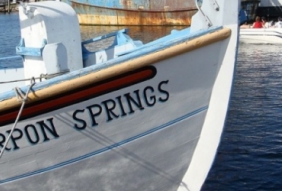
Posted on May 10, 2016
By Juliana A. Torres, TBN
The city of Tarpon Springs has begun the process of lobbying for federal funding needed to dredge the Anclote River – maintenance that will keep the waterfront a working port.
The project falls under the responsibility of the U.S. Army Corps of Engineers and is eligible for federal funding; it will cost an estimated $4.3 million to restore the channel, explained Bob Robertson, the city’s manager for the project during an update to the commission May 3. However, it falls to the city to formally request the maintenance dredging and secure land to dump the dredging spoils at an estimated cost of $750,000 to $1 million.
The city’s new Marine Commerce Committee, charged with pushing the dredging project forward, has begun a public outreach effort. They also secured a letter from U.S. Rep. Gus Bilirakis, R-Florida, requesting the Army Corps of Engineers begin the dredging project – the first step in what likely will be a yearlong process.
“That was submitted to the Army Corps in March, and we are waiting on response,” said Economic Development Manager Karen Lemmons, working as a liaison to the Marine Commerce Committee.
The Tarpon Springs dredging project will compete for federal funding with other, larger ports in Tampa and Jacksonville, for instance, Robertson said.
“What that means is that our project has a lower priority to the Army Corps of Engineers than some of the larger projects that have larger commercial value. But that doesn’t mean our project is not important,” he said.
The U.S. Army Corps of Engineers did respond that they would consider funding the dredging project in the 2018 budget cycle. However, Tarpon Springs hopes to have the project started sooner.
The last time the river was dredged was in 1998. The city estimates just completing phase one – involving environmental studies, permitting and planning the dredging – could take a year and a half to complete, even before the dredging itself begins.
“There’s a lot involved in that. That’s why it takes a year and a half to get done,” Robertson said. “I want to be clear, the Army Corps is happy to do this project. They’re ready to execute it. What they need is funding.”
Funding for phase one must be appropriated through Congress before it can begin. The city hopes Bilirakis or U.S. Sen. Bill Nelson, D-Florida, can secure funding for the project, an estimated $300,000, in the next budget year. That would allow phase one to begin in February 2017 and finish by August 2018, Robertson said.
After that, lobbying for federal funding starts over, this time for about $4 million needed for the dredging itself, phase two of the project. Robertson estimated funding could be secured by February 2020. Phase two is estimated to take only four months, and be completed by June 2020.
Even with an extra year’s delay, Robertson said the project should be completed well within the 25 years of the last dredging, which is the city’s ultimate goal.
The Marine Commerce Committee is planning to meet with Bilirakis and Nelson in person and possibly take them on a boat tour of the river to help them understand the importance of dredging Anclote River, Lemmons said.
“The more information they have, the better they can help us in securing the money,” she said. “Numbers are important, but it’s also helpful to tell them what’s happening in terms of a boat owner who can’t get their shrimp boats in. Or people who are getting stopped on the banks and aren’t coming into the river anymore and losing business opportunities.”
City Manager Mark LeCouris explained that the city was hopeful that federal funding would come through for the project, but the city also could pursue state funding “to get the project moving along.” To that end, the city was investing in an economic study to prove the positive impacts dredging the river would have on local jobs and the economy.
“We think it’s money well invested … to keep being vetoed by the governor,” LeCouris said.
Meanwhile, the Marine Commerce Committee has been working on another front: pursing funding from the county for a site needed to deposit the spoil dredged from the river. The site could be leased or purchased, but ideally would be 7 to 12 acres and close to the river, Robertson said.
“What we’re looking for is a vacant site, one that we can develop to put temporary stormwater holding ponds so the spoiled material can be watered,” he said.
Phase one includes geological and soils testing of the river, which will determine how much silt is in the soil.
“Silt is a factor on where you can move those spoils,” Robertson said “If there’s a low amount of silt, that means that material could potentially be used for beach renourishment.”
In 1998, all the spoils were treated on one site, a site secured through an interlocal agreement with the county. Lemmons said she is hopeful the city can come to a similar arrangement for this project.
The city already has requested a portion of the county’s $7 million in settlement funds from the 2010 Deepwater Horizon Oil Spill. The spoils site is just one of many projects submitted in a recent countywide survey for ways to spend the settlement funds, but Lemmons said the Marine Commerce Committee argued that it was “a perfect use of the money.”
Mayor Chris Alahouzos suggested that the Marine Commerce Committee members, city staff and elected officials all coordinate their upcoming lobbying efforts to Bilirakis and Nelson.
“Everybody knows how important this project is, not only to our local economy, but to our heritage,” he said. “If we synchronize the efforts, I think we will be more successful.”
Source: TBNWeekly.com





